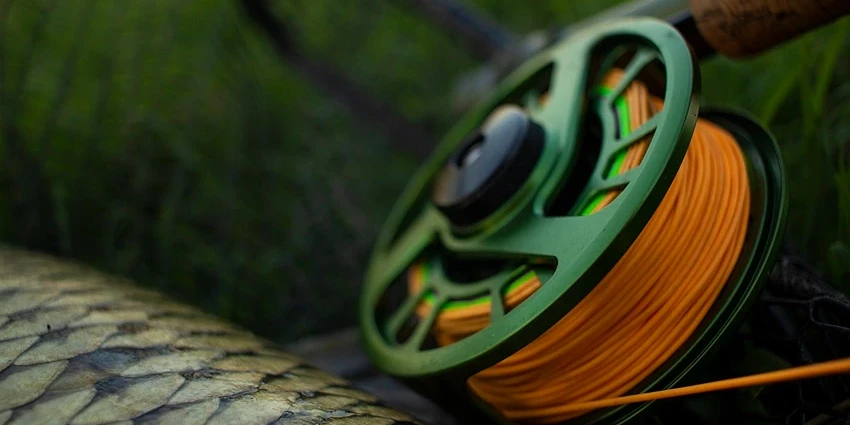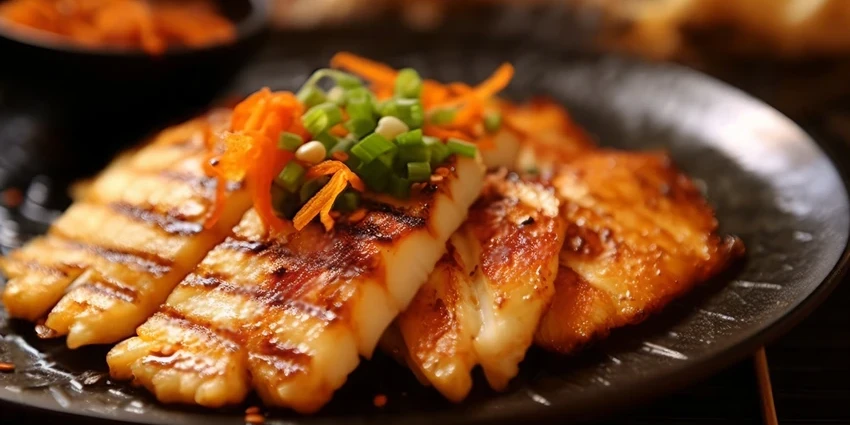All products were chosen independently by our editorial team. This review contains affiliate links and we may receive a commission for purchases made. Please read our affiliates FAQ page to find out more.
Jump to:
Can You Eat a Muskie Fish?
Yes, muskie fish is edible and enjoyed by some anglers. Its white, flaky meat has a mild flavor. However, muskie are more commonly appreciated for sport fishing due to their size and challenging nature. When caught in clean waters and prepared properly, muskie can be consumed like other freshwater fish.
Key Takeaways
- Nutritional Value: Muskie is a source of heart-healthy omega-3 fatty acids and low in calories.
- Cooking Techniques: Popular methods include grilling, baking, and pan-searing.
- Safety and Legality: Muskie is safe to consume with consideration of mercury levels and regional fishing regulations.
Muskie, a fish known for its elusiveness and size, is a topic of interest for many anglers and gourmets. This article delves into various aspects of muskie, from its nutritional value to cooking techniques, making it an informative guide for those curious about this magnificent fish.
Introduction to Muskie Fish
The muskellunge, commonly known as muskie, is a freshwater fish native to North America, particularly in regions like the St. Lawrence River and Great Lakes. Renowned for its size and sporting qualities, muskie is a prized catch among the fishing community. However, its culinary aspects are often overlooked, sparking the question, “Can you eat muskie fish?”
Nutritional Value of Muskie Fish
Muskie is not just a challenging catch but also a nutritious addition to your diet. Here’s a breakdown of its health benefits:
Heart Health and Cognitive Function
Muskie is rich in omega-3 fatty acids, essential for heart health and cognitive functions. These fatty acids help reduce inflammation in the body and enhance brain function.
Comparison with Other Freshwater Fish
When compared to other freshwater fishes like bass and northern pike, muskie stands out for its low-calorie and high-protein profile. This makes it an excellent choice for those following low-carb or keto diets.
Table: Nutritional Comparison
| Nutrient | Muskie | Bass | Northern Pike |
| Calories | Low | Moderate | Low |
| Protein | High | High | Moderate |
| Omega-3 | High | Moderate | High |
Can You Eat Muskie? Safety and Legality
Legal Considerations
Before you plan to catch and cook a muskie, it’s crucial to be aware of local regulations. Fishing for muskies is legal in most places, but strict rules are often in place to protect this species.
Mercury Levels and Health Precautions
Like many predatory fish, muskies can accumulate mercury. While generally safe to consume, it’s advised to eat muskie in moderation, especially for pregnant women, nursing mothers, and young children.
Table: Mercury Levels in Fish
| Fish Type | Mercury Level |
| Muskie | Moderate |
| Tuna | High |
| Salmon | Low |
Cooking Muskie: Popular Recipes and Techniques

Muskie’s firm and flavorful flesh makes it suitable for various cooking methods. Here are some popular techniques and recipes:
Grilling
Grilling gives muskie a delightful
smoky flavor. Brush the fillets with oil, season as desired, and grill each side for about 5 minutes. This method is particularly favored for its ability to enhance the natural flavors of the fish.
Baking
Baking is a healthier option, requiring minimal oil. Simply place the muskie fillets in a dish, add herbs and spices, and bake at 375 degrees Fahrenheit for 15-20 minutes. The result is a tender, flavorful meal that is easy to prepare.
Pan-Searing
For those who prefer a crispy exterior, pan-searing is ideal. After seasoning the fillets, heat oil in a pan and sear each side for 3-4 minutes. This method provides a delightful contrast of textures.
Popular Recipes
- Muskie Fillets with Garlic and Lemon Pepper: This recipe involves seasoning the muskie with garlic and lemon pepper, creating a simple yet flavorful dish. It’s perfect served with rice or couscous.
- Pecan-Nut Crusted Muskie Fillets: This unique recipe coats muskie fillets in a mix of pecans and bread crumbs, then bakes them to a golden brown. It offers a combination of succulent and crunchy textures.
- Baked and Grilled Muskie Techniques: Traditional baking and grilling techniques bring out the best in muskie, making it a versatile option for various diets.
Recipes and methods adapted from sources like Cast and Spear, Express Fishings, and Outdoorgeeky.
Fishing for Muskie: Techniques and Tips
Catching muskie is a blend of skill, patience, and the right approach. Here are some essential tips and techniques:
Best Practices for Catching Muskie
- Bait Sizes: Use baits between 8 to 12 inches to attract muskie, considering their preference for larger prey.
- Habitats: Muskies are often found in deeper waters, near structures like weed beds.
- Fishing Seasons: The best times to fish for muskie are in early spring or late fall.
Table: Ideal Conditions for Muskie Fishing
| Condition | Description |
| Water Depth | 15 to 40 feet deep |
| Bait Size | 8 to 12 inches |
| Season | Early spring, Late fall |
Preparing Muskie for Cooking

Preparing muskie involves cleaning and filleting, which can be a bit challenging due to its unique bone structure.
Step-by-Step Guide on Cleaning and Filleting
- Start by slicing up from the pectoral fin to the back of the head.
- Run your knife down the ridge of the back to the tail, carefully removing the filet.
- With the filet skin side down, locate and remove the Y-bones.
Adapted from Cast and Spear, Panfish Nation
Register for our latest in-depth reviews and product round-ups from the experts
Enter your email address below to receive our twice monthly reviews emails.
By entering your details, you are agreeing to our terms and conditions and privacy policy. You can unsubscribe at any time.
FAQs about Eating Muskie Fish
Muskie is safe to consume with some considerations regarding mercury levels. It’s advised to eat muskie in moderation, particularly for certain vulnerable groups.
While technically possible, it’s not recommended due to the fish’s toughness and flavor profile.
Yes, muskie is a healthy addition to your diet, offering low calories, high protein, and omega-3 fatty acids.
Martin Cochran, renowned for his expertise in deep-sea fishing and marine wildlife, plays a pivotal role at Fresh Catch Daily. His adventures across various oceans have equipped him with unique insights and techniques, enriching our platform with diverse and engaging content for fishing enthusiasts.








